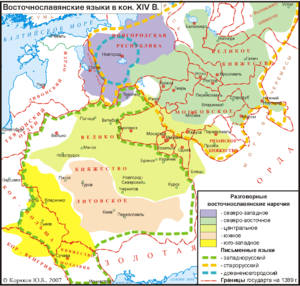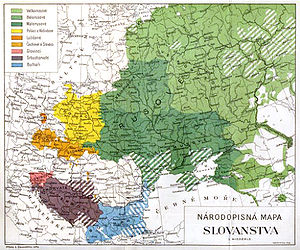- Ruthenian language
-
For other uses, see Ruthenian language (disambiguation).
Rusyn language [disambiguation needed
 ]
]Ruthenian Old Ruthenian
руский языкъ ruskij jazykŭSpoken in Polish-Lithuanian Commonwealth, (language of administration of Grand Duchy of Lithuania until 1699) Extinct developed into Belarusian, Ukrainian and Rusyn. Language family Indo-European- Balto-Slavic
- Slavic
- East Slavic
- Ruthenian
- East Slavic
- Slavic
Language codes ISO 639-3 – Linguist List orv-olr Ruthenian, or Old Ruthenian (see other names), is a term used for the varieties of Eastern Slavonic spoken in the Grand Duchy of Lithuania and later in the East Slavic territories of the Polish–Lithuanian Commonwealth.
Scholars do not agree whether Ruthenian was a separate language or a Western dialect(s) of Old East Slavic, but it is agreed that Ruthenian has a close genetic relationship with it. Old East Slavic was the colloquial language used in Kievan Rus' (10th – 13th centuries).[1] Ruthenian can be seen as a predecessor of modern Belarusian, Rusyn and Ukrainian. Indeed all these languages, from Old East Slavic to Rusyn, have been labelled as Ruthenian (Ukrainian: Рутенська мова).
Contents
Nomenclature
In modern texts, the language in question is sometimes called "Old Belarusian" or starabiełaruskaja mova (Belarusian: “Старабеларуская мова”) and "Old Ukrainian" or staroukrajinska mova (Ukrainian: “Староукраїнська мова”). As Ruthenian was always in a kind of diglossic opposition to Church Slavonic, this vernacular language was and still is often called prosta(ja) mova (Cyrillic проста(я) мова, literally "simple language". Contemporary sources only rarely draw any distinction between the dialect of the Grand Duchy of Lithuania and the dialect of the Grand Principality of Vladimir.[citation needed]
On the other hand there exists a school of thought that Old Belarusian and Old Ukrainian must be considered as separate historical languages.
- Names in contemporary use
- Ruthenian (Old Belarusian: руски езыкъ) — by the contemporaries, but, generally, not in contemporary Muscovy.
- (variant) Simple Ruthenian or simple talk (Old Belarusian: простый руский (язык) or простая молва) — publisher Grigoriy Khodkevich (16th century).
- Lithuanian (Russian: Литовский язык) — possibly, exclusive reference to it in the contemporary Muscovy. Also by Zizaniy (end 16th cent.), Pamva Berynda (1653).
- Names in modern use
- (Old) Ruthenian — modern collective name, covering both Old Belarusian and Old Ukrainian languages, predominantly used by the 20th cent. Lithuanian, also many Polish and English researchers.
- (Old) West Russian, language or dialect (Russian: (Древний) западнорусский язык, Russian: (Древнее) западнорусское наречие) — chiefly by the supporters of the concept of the Proto-Russian phase, esp. since the end of the 19th century, e.g., by Karskiy, Shakhmatov.
- (Old) Belarusian (language) — rarely in contemporary Muscovy. Also Kryzhanich. The denotation Belarusian (language) (Russian: белорусский (язык)) when referring both to the 19th century language and to the Medieval language had been used in works of the 19th cent. Russian researchers Fyodor Buslayev, Ogonovskiy, Zhitetskiy, Sobolevskiy, Nedeshev, Vladimirov and Belarusian nationalists, such as Karskiy.
- Lithuanian-Russian (Russian: литовско-русский) — by 19 cent. Russian researchers Keppen, archbishop Filaret, Sakharov, Karatayev.
- Lithuanian-Slavonic (Russian: литово-славянский) — by 19 cent. Russian researcher Baranovskiy.[2]
- Russian-Polish or even Polish dialect — Shtritter, Polish researcher Samuel Bogumił Linde, Polish writer Wisniewski. Notably, the definition had been used even when referencing to Skaryna’s translation of Bible.
- Old Ukrainian or staroukrajinska mova (Ukrainian: “Староукраїнська мова”).
Note that ISO/DIS 639-3 and SIL currently assigns the code rue for the language which is documented with native name "русин (rusyn)", that they simply named "Ruthenian" in English (and "ruthène" in French) instead "modern Ruthenian" (and "ruthène moderne" in French) : this code is now designated as the Rusyn language.
Divergence between literary Ruthenian and literary Russian
As Eastern Europe gradually freed itself from the "Tatar yoke" in the 14th century, there were four princes that adopted the title of Grand Duke. Two of them started to collect the East Slavic territories: one in Moscow and one in Halych. These activities resulted in two separate mainly East Slavic states, the Grand Duchy of Moscow, which eventually evolved into the Russian Empire, and the Grand Duchy of Lithuania, which covered roughly the territories of modern Belarus, Ukraine and Lithuania and later united with Poland to form the Polish-Lithuanian Commonwealth. Linguistically, both states continued to use the regional varieties of the literary language of Kievan Rus', but due to the immense Polish influence in the west and to the Church Slavonic influence in the east, they gradually developed into two distinct literary languages: Ruthenian in Lithuania and the Commonwealth, and (Old) Russian in Muscovy. Both were usually called Ruskij (of Rus’) or Slovenskij (Slavonic); only when a differentiation between the literary language of Muscovy and the one of Lithuania was needed was the former called Moskovskij 'Muscovite' (and, rarely, the latter Lytvynskij 'Lithuanian').
This linguistic divergence is confirmed by the need for translators during the mid 17th century negotiations for the Treaty of Pereyaslav, between Bohdan Khmelnytsky, ruler of the Zaporozhian Host, and the Russian state.
Continuing Polish influence
Since the Union of Lublin in 1569, the southern territories of the Grand Duchy of Lithuania came under direct administration by the Polish Crown, whereas the north retained some autonomy. It is possible that this resulted in differences concerning the status of Ruthenian as an official language and the intensity of Polish influence on Ruthenian.[citation needed] However, in both parts of the Commonwealth inhabited by Eastern Slavs, Ruthenian remained a lingua franca, and in both parts it was gradually replaced by Polish as a language of literature, religious polemic, and official documents.
New national languages
Ethnographic map of the Slavic peoples prepared by Czech ethnographer Lubor Niederle showing territorial boundaries of Slavic languages in Eastern Europe in the mid 1920s
With the beginning of romanticism at the turn of the 19th century, literary Belarusian and literary Ukrainian appeared, descendant from the popular spoken dialects and little-influenced by literary Ruthenian. Meanwhile, Russian retained a layer of Church Slavonic "high vocabulary", so that nowadays the most striking lexical differences between Russian on the one hand and Belarusian and Ukrainian on the other are the much greater share of Slavonicisms in the former and of Polonisms in the latter.
The split between literary Ruthenian and the successor literary languages can be seen at once in the newly-designed Belarusian and Ukrainian orthographies.
The interruption of the literary tradition was especially drastic in Belarusian: In the Polish-Lithuanian Commonwealth, Polish had largely replaced Ruthenian as the language of administration and literature. After that Belarusian only survived as a rural spoken language with almost no written tradition until the mid-nineteenth century.
In contrast to the Belarusians and Eastern Ukrainians, the Western Ukrainians who came to live in Austria-Hungary retained not only the name Ruthenian but also much more of the Church Slavonic and Polish elements of Ruthenian. For disambiguation, in English these Ukrainians are usually called by the native form of their name, Rusyns.
Thus, by 1800, the literary Ruthenian language had evolved into three modern literary languages. For their further development, see Belarusian language, Rusyn language, and Ukrainian language.
See also
References
- ^ Ukrainian language, Encyclopædia Britannica
- ^ Cited in Улащик Н. Введение в белорусско-литовское летописание. — М., 1980.
- Brogi Bercoff, Giovanna: “Plurilingualism in Eastern Slavic culture of the 17th century: The case of Simeon Polockij.” In: Slavia: Časopis pro slovanskou filologii, vol. 64. p. 3-14.
- Danylenko, Andrii: "'Prostaja mova', 'Kitab', and Polissian Standard". In: Die Welt der Slaven LI (2006), no. 1, p. 80-115.
- Danylenko, Andrii: "On the Name(s) of the prostaja mova in the Polish-Lithuanian Commonwealth," In: "Studia Slavica Hung.", 51/1-2 (2006),p. 97-121
- Dingley, Jim [James]. “The two versions of the Gramatyka Slovenskaja of Ivan Uževič.’ In: The Journal of Byelorussian Studies, 2.4 (year VIII), p. 369-384.
- Frick, David A. "'Foolish Rus': On Polish civilization, Ruthenian self-hatred, and Kasijan Sakovyč." In: Harvard Ukrainian studies 18.3/4 (1994), p. 210-248.
- Martel, Antoine. La langue polonaise dans les pays ruthènes: Ukraine et Russie Blanche 1569/1667. Lille 1938.
- Moser, Michael: "Mittelruthenisch (Mittelweißrussisch und Mittelukrainisch): Ein Überblick." In: Studia Slavica Academiae Scientiarum Hungaricae 50 (2005), no. 1-2, p. 125-142.
- Mozer [= Moser], Michaėl’. "Čto takoe 'prostaja mova'?". In: Studia Slavica Academiae Scientiarum Hungaricae 47.3/4 (2002), p. 221-260.
- Pivtorak, Hryhorij. “Do pytannja pro ukrajins’ko-bilorus’ku vzajemodiju donacional’noho periodu (dosjahnennja, zavdannja i perspektyvy doslidžen’)”. In: Movoznavstvo 1978.3 (69), p. 31-40.
- Pugh, Stefan M.: Testament to Ruthenian. A Linguistic Analysis of the Smotryc’kyj Variant. Cambridge 1996 (= Harvard Series of Ukrainian Studies).
- Shevelov, George Y. “Belorussian versus Ukrainian: Delimitation of texts before A.D. 1569”. In: The Journal of Byelorussian Studies 3.2 (year 10), p. 145-156.
- Stang, Christian: Die westrussische Kanzleisprache des Grossfürstentums Litauen. Oslo 1935 (= Skrifter utgitt av Det Norske Videnskaps-Akademi i Oslo, Historisk-filosofisk Klasse 1935,2).
- Strumins’kyj, Bohdan. “The language question in the Ukrainian lands before the nineteenth century”. In: Aspects of the Slavic language question. Ed. Riccardo Picchio, Harvey Goldblatt. New Haven 1984, vol. 2, p. 9-47.
External links
Slavic languages History West Slavic East Slavic Belarusian · Carpathian Rusyn · Iazychie · Old East Slavic · Old Novgorod dialect · Pannonian Rusyn · Russian · Ruthenian · UkrainianSouth Slavic Bulgarian · Church Slavonic · Macedonian · Old Church Slavonic · Serbo-Croatian (Bosnian · Croatian · Montenegrin · Serbian) · SloveneConstructed languages Pan-Slavic language (Slovianski · Slovio)Separate dialects and
Slavic microlanguagesBanat Bulgarian · Burgenland Croatian · Chakavian · East Slovak · Kajkavian · Lachian · Molise Croatian · Prekmurian · Resian · Slavic dialects of Greece · Shtokavian · West Polesian · TorlakianItalics indicate extinct languages. Categories:- Languages with Linglist but no iso3 codes
- East Slavic languages
- Post-medieval linguistic constructs about the Middle Ages
- Rus
- Ukrainian population groups
- Balto-Slavic
Wikimedia Foundation. 2010.


